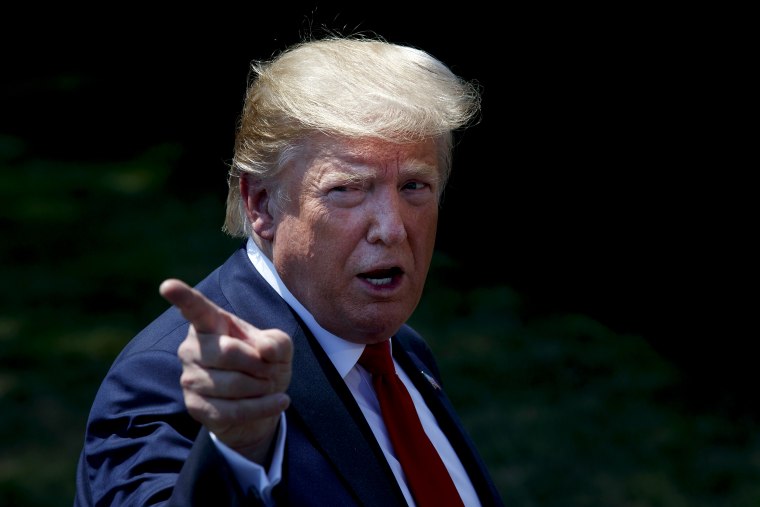A federal appeals court ruled Tuesday that it would not block congressional subpoenas for President Donald Trump's financial records from Deutsche Bank and Capital One, affirming a lower court ruling and dealing the president another legal blow.
Trump and several members of his family sued Deutsche Bank and Capital One this year seeking to block them from responding to the subpoenas issued by House Democrats, which they said had "no legitimate or legislative purpose." The Democratic-controlled House Intelligence and Financial Services committees issued the subpoenas in April as part of investigations into alleged foreign influence in U.S. elections.
Judge Jon O. Newman of the U.S. 2nd Circuit Court of Appeals wrote in a more than 100-page decision that the Trumps' "motion for a preliminary injunction was properly denied, except as to disclosure of any documents that might be determined to be appropriate for withholding from disclosure pursuant to our limited remand."
Download the NBC News app for breaking news and politics
"The serious‐questions standard is inapplicable, the balance of hardships does not tip decidedly in favor of Appellants, and the public interest favors denial of a preliminary injunction," the decision read.
The ruling placed a seven-day stay on the subpoenas so that the Trumps may file an appeal.
One judge, Debra Ann Livingston, dissented in part with the ruling and filed a separate opinion, in which she wrote the "present record is insufficient" to support the majority ruling that the Trump records "should at this time be produced." The Trumps, she said, "raised serious questions on the merits" and "are entitled to preliminary relief."
Livingston said she concurred with the majority that the Trumps "raised no serious question suggesting that the House subpoenas may not be enforced," but that those were not the "only arguments presented."
Jay Sekulow, an attorney for Trump, said in a statement that the president's legal team is considering appealing the ruling to the Supreme Court.
“We believe the subpoena is invalid as issued," Sekulow said. "In light of the 2nd Circuit decision, we are evaluating our next options including seeking review at the Supreme Court of the United States."
A Deutsche Bank spokesperson said, "As we have said previously, we remain committed to providing appropriate information to all authorized investigations and will abide by a court order regarding such investigations."
Capital One, House Intelligence Committee Chairman Adam Schiff, D-Calif., and House Financial Services Chairwoman Maxine Waters, D-Calif., welcomed the ruling.
"The Second Circuit decision is another in a long line of decisions strongly affirming 'a broad power of Congress and its committees to obtain information in aid of its legislative authority under Article I of the Constitution.' the lawmakers said in a joint statement, adding "This ruling ensures that a significant amount of the materials sought by our Committees will continue to be produced."
House Speaker Nancy Pelosi, D-Calif., called the decision "another victory for the rule of law, our Constitution and our American Democracy."
Deutsche Bank has lent Trump's business millions of dollars over the years, even when the president was on tough financial footing decades ago. Capital One is among the banks where Trump has personal accounts.
In August, Deutsche Bank disclosed in a court filing that it possessed tax returns tied to Trump. It was unclear exactly who or what entity the returns belonged to.
CLARIFICATION (Dec. 3, 2019, 1:24 p.m. ET): A previous version of this article implied that all three judges on the 2nd Circuit Court of Appeals wholly concurred with the decision. One judge, Debra Ann Livingston, concurred with most of the opinion but dissented in part and filed a separate opinion. The current version of the article has been updated to reflect her opinion.

